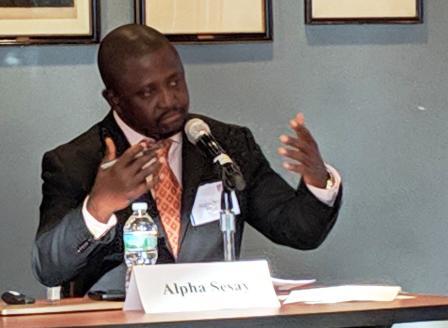A Message to the AU: Why Justice Matters
When African leaders assemble in Malabo, Equatorial Guinea on June 30 for the African Union summit, they will discuss numerous challenges confronting the continent. No doubt economic and political issues will take center stage, but international criminal justice is also likely to be in the spotlight.
More than 125 African-based civil society organizations from more than 25 countries have come together to urge African leaders to use this important opportunity to show their support for the International Criminal Court (ICC) and to press for cooperation with the court. I am proud to be part of that effort.
When the ICC issued arrest warrants for President Omar al-Bashir of Sudan for genocide, war crimes, and crimes against humanity committed in Darfur, the AU expressed deep concern over the warrants. It pressed the UN Security Council to suspend the case and when it didn’t, the AU called on African states not to cooperate with arresting President al-Bashir. Meanwhile, the AU chairman repeatedly criticized the court for targeting Africans.
By working to create the ICC and ratifying the Rome Treaty, which established the court, African ICC states parties made a giant step forward in ending the culture of impunity on the continent. We cannot afford to reverse the gains we have made by withdrawing our support from the ICC.
It is a fact that all situations under ICC investigation to date are in Africa, which has been a source of disquiet among some observers. However, the number of African cases is also a manifestation of the growing African commitment to justice. It is true that international justice has yet to be applied evenly around the globe. But civil society organizations believe Africa should build on its support for accountability as opposed to scaling down its resolve because others have failed to demonstrate their commitment or have managed so far to avoid judicial scrutiny.
Over the last decade, the governments of Sierra Leone, Nigeria, and Liberia, among others, have demonstrated a genuine commitment to promoting international criminal justice. By asking the United Nations to set up a special court to try those most responsible for the heinous crimes during the decade-long civil war in Sierra Leone, my government and the people of Sierra Leone joined their counterparts in Rwanda in calling for an end to impunity on the continent.
Nigeria was not only in the first batch of 13 countries whose voluntary financial contributions helped establish the Special Court for Sierra Leone, but it also handed over Charles Taylor, then a fugitive in Nigeria, to the court at the request of President Ellen Johnson-Sirleaf of Liberia.
These are very significant contributions, but continued resolve to support justice for victims by West African governments is needed. Ahead of the AU summit, our civil society organizations from across the continent issued a report which calls for African ICC states parties to undertake a range of actions to support justice for serious crimes.
Specifically, we urge states to press the AU to work to extend the reach of international justice, not to curtail it. We urge the AU to direct any outstanding concerns about suspending ICC cases to the Security Council, and not the court, which has no authority to defer cases. We call for the AU to hold further consultations on challenges related to the anticipated expansion of the African Court of Justice and Human Rights to prosecute grave crimes to ensure that any expansion does not impede the ICC’s role as a crucial court of last resort.
Concerns also have been expressed about the Security Council resolutions about Libya. But we hope that the AU will make a distinction between the issue of the use of force in Libya and the ICC’s distinct judicial process as a result of the Security Council’s referral. Finally, we call for African states to support the election of the most qualified candidate as the next ICC prosecutor through a fair and merit-based process.
Africans believe that continued cooperation with the ICC will strengthen regional efforts both to promote peace and justice and to encourage economic and institutional development. African leaders should make the right decision by siding with their people at next week’s summit!
By Ibrahim Tommy. Ibrahim Tommy is the Executive Director of the Center for Accountability and Rule of Law (CARL) – Sierra Leone.
Stay with Sierra Express Media, for your trusted place in news!
© 2011, https:. All rights reserved.





